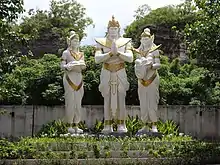Vinata
According to Hindu legends, Vinata is the mother of birds. She is one of the thirteen daughters of Prajapati Daksha. Married to Kashyapa along with her 12 sisters. She bore him two sons, named Aruṇá, and Garuda (Suparna).[1]
| Vinata | |
|---|---|
The Mother of the Birds | |
 Statue of Kashyapa with his two of his wives, Kadru (right) and Vinata (left). | |
| Personal information | |
| Parents | Daksha (father) |
| Spouse | Kashyapa |
| Children | Aruṇa and Garuda |
Legends
Vinata was a daughter of Daksha. She was married to Kashyapa along with her 12 sisters. Kadru was her younger sister, and when they both lived with Kashyapa as his wives and attended to all his comforts he blessed them by granting each of them a boon.[2] Kadru asked for a thousand nāga or serpent sons who should be valiant. Prompted by her sister's demand for sons, Vinata asked for only two sons who should be more powerful and bright than Kadru's children. Kashyapa granted them their wishes. After his wives became pregnant, he advised them to look after the children, and then left for his penance in the forest.
After a long time Kadru gave birth to a thousand eggs and Vinata to two eggs. The eggs were carefully incubated in containers with hot water or in jars which were kept warm. After a lapse of five hundred years, the eggs laid by Kadru hatched and her sons came to life; of these thousand nāga sons, the most prominent ones were Shesha, Vasuki and Takshaka. All the serpents born in this world are the descendants of these thousand sons. Vinata became jealous as her eggs had not hatched. In a moment of haste, she broke open one of the eggs, revealing a half-formed son. This son was enraged by his physical form and cursed his mother for her hasty act, saying she would be a slave to Kadru for five hundred years till the son from her second egg was born. He became a charioteer and herald for the sun god and the creator of the red sky at dawn, and was therefore named Aruṇa. Eventually, after five hundred years, Vinata's second son Garuda was born in the form of a huge bird with immense power. As soon as he was born he flew away with grace, seeking food.
Reference
- Söhnen, Renate; Söhnen-Thieme, Renate; Schreiner, Peter (1989). Brahmapurāṇa: Summary of Contents, with Index of Names and Motifs. Otto Harrassowitz Verlag. ISBN 978-3-447-02960-5.
- Mani, Vettam (1975). Puranic encyclopaedia : a comprehensive dictionary with special reference to the epic and Puranic literature. Robarts - University of Toronto. Delhi : Motilal Banarsidass.